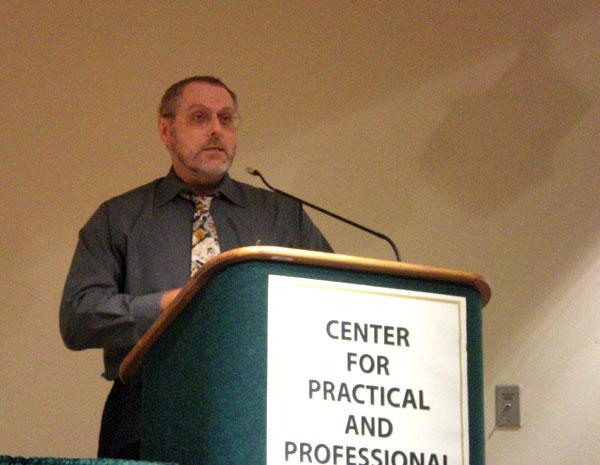Wall Street Journal reporter visits campus

Andrew Pasztor focused his lecture around ethics controversies that have involved government contracting in recent years.:
February 18, 2008
Most students are unaware of the controversies behind the business dealings of the Pentagon and United States Air Force.
The opening anecdote in Andrew Pasztor’s talk today on imposing ethics in government hoped to clarify the issue for students.
“A third grade child has a teacher who discusses ethics in class one day. The child goes home to his father and says he is confused and asks his father to explain,” Pasztor said.
“The father goes on to tell the child that he and his brother run a company that repairs roofs in the village they live in. ‘A couple weeks ago we repaired an old lady’s roof,’ said the father. ‘She gave us twice as much money as we charged.'”
“The child asked what that had to do with ethics and the father said, ‘Well, ethics is whether I choose to give half the money to your uncle or not.'”
Pasztor, a Wall Street Journal reporter for 30 years, has covered everything from environmental issues to federal scandals.
He focused his lecture around ethics controversies that have involved government contracting in recent years.
Boeing, a major aerospace and defense contractor, was the main example in Pasztor’s explanation of current and past corruption occurring in the government contracting industry.
“Boeing has become the poster child of ethical violations and illegal practices,” Pasztor said.
“The CEO was fired and two former senior executives were prosecuted and went to jail. The Secretary of the Air Force was also forced to resign. The Air Force was then forced to turn over decisions to the Pentagon because of the controversy,” Pasztor said.
Pasztor explained the Boeing controversy and went on to explain the discrepancies between law and ethics.
He also posed a question: If something is legal does that always make it ethical?
Pasztor encouraged skeptics to not be discouraged though. He is optimistic about the advances defense contractors are making in developing a sense of standards.
“Many transatlantic companies have come together to agree on international standards of conduct,” Pasztor said.
The lecture was a part of the Sacramento Region Community Foundation’s efforts to bring the promotion of ethical practices to the Sacramento State community.
Amanda Pollard can be reached at [email protected].




























































































































